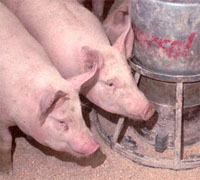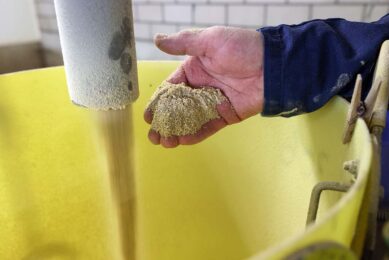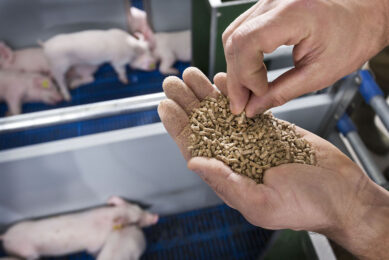FDA silently continues backing certain antibiotics in animal feed

The US Food and Drug Administration (FDA) has decided not to withdraw penicillin and tetracyclines in animal feed, backing away from the agency’s initial intention to do so. The news was not announced, but was published in the Federal Register just before the holidays.
In 1977, the FDA first announced its intention to withdraw the animal drug approvals – penicillin outright and the subtherapeutic use of tetracycline – citing microbial food safety concerns, but now the agency is planning to “focus its efforts for now on the potential for voluntary reform and the promotion of the judicious use of antimicrobials in the interest of public health,” according to the notice.
FDA said in the notice that despite this action, the agency “remains concerned about the issue of antimicrobial resistance.”
“Today’s action should not be interpreted as a sign that FDA no longer has safety concerns or that FDA will not consider re-proposing withdrawal proceedings in the future, if necessary,” said the notice.
“FDA has not ruled out the prospect of future regulatory action, either with respect to the antimicrobial new animal drugs covered by the 1977 NOOHs (Notice for Opportunity for Hearing) or any others.”
The agency says it will focus on voluntary reforms and if that strategy “does not yield satisfactory results” the possibility of pursuing withdrawals is still on the table.
Silent note
Maryn McKenna, public health journalist and author of Superbug, broke the story, which is likely to get lost in the holiday bustle.
Maryn McKenna, public health journalist and author of Superbug, broke the story, which is likely to get lost in the holiday bustle.
“There is a lot of background to this, but here is the takeaway: For 34 years, the FDA has been contending that administering small doses of antibiotics to healthy animals is an inappropriate use of increasingly scarce drugs – a position in which it is supported by organizations as mainstream as the American Medical Association,” wrote McKenna.
“With this withdrawal, it backs away from the actions it took to support that assertion — which may indicate there will be no further government action on the issue until after the 2012 election.”
Environmental groups dismayed
Environmental and consumer groups have condemned FDA’s move to renege on its long-held policy to regulate the use of human antibiotics in animal feed.
Environmental and consumer groups have condemned FDA’s move to renege on its long-held policy to regulate the use of human antibiotics in animal feed.
Critics say the U-turn, which comes amid the FDA’s own stated concerns over food safety, is at odds with its obligations to protect the public.
The groups also criticised the timing of the announcement, which was made during the holiday season and disclosed only in the federal register.
The use of low doses of antibiotics in agricultural animal feed contributes to drug-resistant superbugs, according to food and health experts.
“It’s dismaying, and obviously something they felt sheepish about, otherwise it wouldn’t have been released this week,” Michael Pollan, author of the Onmivore’s Dilemma and Food Rules: An Eater’s Manual, told the Guardian.
“When Margaret Hamburg became the head of the FDA, she indicated this was a high priority for them and that she realised how much of a problem the profligate use of antibiotics was. She said she was going to treat this issue as if her hair was on fire. This isn’t the way someone acts when their hair is on fire.”
Pollan said there was “no question” that meat could be produced without human antibiotics, as the EU has already banned them.
Powerful industry
The problem, said Pollan, boils down to a lack of political will in the face of powerful industry interests.
The problem, said Pollan, boils down to a lack of political will in the face of powerful industry interests.
“There’s a lot of corporate money in politics these days,” he said. “Here you’re going up against not just one powerful industry, but two. This administration has had enough trouble going after individual powerful industries. That they would prevail against two of them joined together was too much to hope for.”
Avinash Kar, an attorney with the Natural Resources Defense Council (NRDC), described the move as a “step backwards” for the FDA.
Kar believes the move is an attempt to get around a lawsuit filed by the NRDC to force the FDA to withdraw approval for the practice of mixing human antibiotics into animal feed.
The lawsuit, filed in May, asked the court to declare that the FDA had violated federal law by failing to withdraw approval of using penicillin and tetracycline in animal feed when animal health is not at stake.
“This action by the FDA is a response to our lawsuit” said Kar. “The findings in 1977 were included in the notice for opportunity for a hearing, and they think they can get around the lawsuit by withdrawing the notices for opportunities for a hearing. But we will not allow the FDA to ignore public health.”
In response to the FDA’s reliance on voluntary regulations, Kar said: “We don’t believe that the industry will voluntarily regulate itself, because for the last 33 years the approach has been voluntary and the use of antibiotics in livestock has not gone down but – based on estimates – has gone up.”
Slaughter disappointed
Politicians also expressed dismay at the FDA’s move. In a statement on her website, Democratic congresswoman Louise Slaughter, the author of the Preservation of Antibiotics for Medical Treatment Act (Pamta), a legislative framework aimed at tackling antibiotic resistance, she expressed her opinion.
“Every year, 100,000 Americans die from bacterial infections acquired in the hospital and this is just the tip of the iceberg. Seventy percent of these infections are resistant to drugs commonly used to treat them. I wonder how many lives could have been saved if these proposals were adopted in 1977 as they should have been.
“We need to get our head out of the sand and start taking public health advice from scientists rather than industry lobbyists.”
Join 18,000+ subscribers
Subscribe to our newsletter to stay updated about all the need-to-know content in the pigsector, three times a week. Beheer
Beheer










 WP Admin
WP Admin  Bewerk bericht
Bewerk bericht